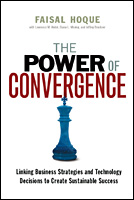 Faisal Hoque, F. The Power of Convergence: Linking Business Strategies and Technology Decisions to Create Sustainable Success. New York: AMA, 2011.
Faisal Hoque, F. The Power of Convergence: Linking Business Strategies and Technology Decisions to Create Sustainable Success. New York: AMA, 2011.
Felisa J.Parris
Faisal Hoque, a former executive, is the founder and CEO of BTM Corporation. The BTM Corporation specializes in convergence transformative practices and best practices research. In 2008, Hoque was christened “Mr. Convergence” by CIO Quarterly magazine and named one of the top most influential peopled in technology. In The Power of Convergence: Linking Business Strategies and Technology…

 Richard J. Davidson and Sharon Begley. The Emotional Life of your Brain. New York, New York: Hudson Street Press, 2012.
Richard J. Davidson and Sharon Begley. The Emotional Life of your Brain. New York, New York: Hudson Street Press, 2012.